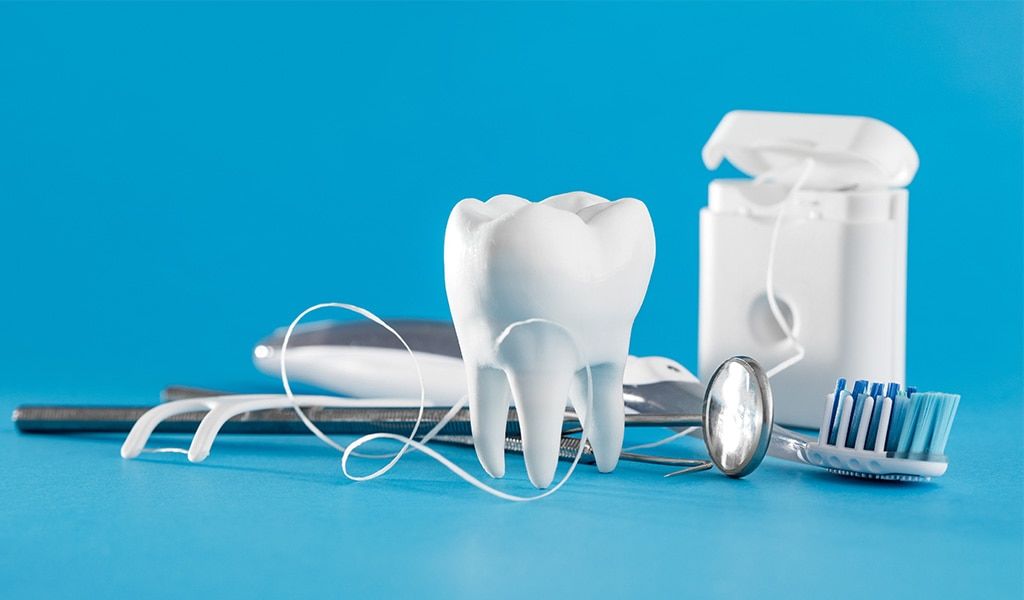Brush at least twice a day.
- Brush your teeth at least twice a day.
- Brush for at least two minutes.
- Use a soft-bristled brush, and brush in circular movements to reach the inside of each tooth.
- Brushing the tongue is also important to remove bacteria that can cause bad breath and cavities on the back of your teeth.
- Make sure you use fluoride toothpaste, which helps strengthen tooth enamel and prevent decay by strengthening its outer layer against acids produced by bacteria in plaque.[i]
Floss every day.
Flossing is a vital part of your dental health. It removes plaque, which can lead to gum disease and tooth decay. Flossing is easier than you think, and it’s much less time consuming than brushing. Simply wind the floss around two fingers, insert it between teeth, then move up and down (or back and forth) until the space is clean. You may find that it helps to hold a piece of floss between your teeth with your tongue while you slide out the rest through a gap in your lips or undercuts on top of teeth.
Rinse with mouthwash.
Rinse with mouthwash.
You can use mouthwash to kill germs and freshen your breath, but it can also help with other dental problems. If you have bad breath, dry mouth, or cavities in your teeth, a rinse of mouthwash may make those conditions better.
Chew sugarless gum.
Chewing gum is another great way to care for your teeth. While it doesn’t actually clean your teeth, chewing gum helps by stimulating the production of saliva and washing away debris from in between your teeth. Chewing gum also helps to keep bad breath at bay, as well as alleviate dry mouth symptoms.
See your dentist regularly.
Visiting your dentist regularly is important for keeping your teeth healthy, beautiful and strong. Your dentist can also help you to prevent problems before they occur.
Some of the reasons why it’s a good idea to visit a dentist regularly include:
- They are trained in diagnosing any dental health issues that may be affecting you.
- They can tell if there are any signs of tooth decay or gum disease so that treatment plans can be put into place before serious problems develop.
- Dentists are trained in cleaning methods, so they can provide this service at each visit if necessary. This includes scaling and polishing teeth with ultrasonic instruments which removes plaque from even hard-to-reach areas between teeth where food particles often get stuck; manual cleaning with special brushes is also done at every appointment as part of routine care to remove surface stains; flossing helps remove particles trapped in between individual teeth which would otherwise lead to discoloration over time—so while flossing daily has its own benefits in addition those already mentioned here such as preventing gum inflammation/bleeding etc., it’s important also because it serves as another method besides brushing alone for removing food particles from these difficult spots within our mouths which otherwise might stay there indefinitely causing damage over time without intervention from us!
Your teeth will be much happier when you take care of them!
When you have healthy teeth, your whole body will benefit. Your smile will be bright and beautiful, and you’ll feel better about yourself.
Brushing, flossing and rinsing are easy to do every day. You could even make it a fun routine with family or friends! It’s important to rinse after meals because leftover food can cause plaque to build up on your teeth. You should also brush after meals if possible—after breakfast is best so the toothpaste has time to work its way into the surface of your teeth before they get coated again with food particles during lunch or dinner! Don’t forget that brushing at night is important too: this helps prevent bad breath in the morning!
Regular visits to the dentist are important for keeping your smile healthy—and don’t worry if you need extra help sometimes because we’re here to help!


